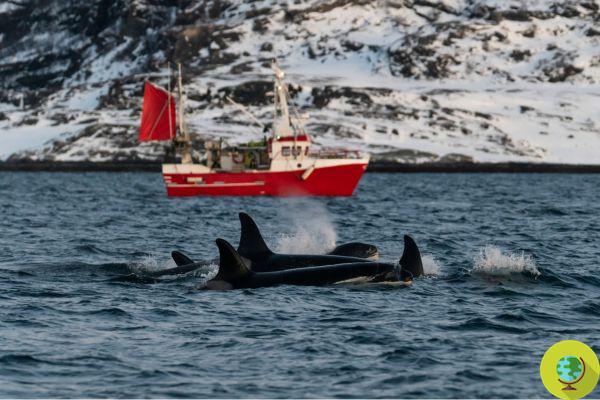
Two boats were rammed by the killer whales and one crew member suffered bruises from the impact.
In the past two months, both in the south and north of Spain, sailors have sent out distress calls after troubling encounters. Two boats were rammed by the killer whales and one crew member suffered bruises from the impact. Scientists say they are baffled because, never before, such incidents have occurred and wonder what is causing this aggression.
From the Strait of Gibraltar to Galicia, killer whales rammed yachts, damaged ships and injured crews. The latest incident took place on Friday afternoon off A Coruña, on the northern coast of Spain. Halcyon Yachts was taking a boat to the UK when an orca rammed her stern at least 15 times. The boat lost the rudder and was towed to port to assess the damage.
Around the same time there were radio warnings to the south in Vigo, while on August 30, a French-flagged ship radioed the coast guard to say it was "under attack" by killer whales. On the same day, a yacht of the Spanish navy, Mirfak lost the helm for the same reason.
"We have never seen or heard of attacks before," say the alarmed scientists.
Social and highly intelligent mammals, killer whales are the largest of the dolphin family. Researchers studying a small population in the Strait of Gibraltar define them as curious animals and it is normal for them to follow a boat closely, even to interact with the rudder, but never with the force described here.
The Spanish maritime authorities warn to 'keep your distance', but this is difficult. Scientists agree that this behavior is "highly unusual" and "worrying", but argue that it is still too early to understand what is going on. The first hypothesis could be that the pods are stressed and that in general, the population is in danger.
As The Guardian recounts, on July 29, off Cape Trafalgar, Victoria Morris was aboard a ship surrounded by nine killer whales. The cetaceans rammed the hull for over an hour, spinning the boat 180 degrees, turning off the engine and breaking the rudder. The episodes all have the same dynamic, but it is not known if the same pod is always ramming the boats.
"These are very strange events," says Ezequiel Andréu Cazalla, a cetacean researcher, "But I don't think they are attacks." The specialists are equally surprised, agreeing on the "very unusual" behavior, but they are cautious. Most agree that something is stressing the killer whales. And when it comes to sources of stress, there are plenty to choose from.
Gibraltar killer whales are in danger - fewer than 50 pods remain with continued decline predicted - adults and juveniles are suffering injuries, suffering from food shortages and pollution. Their cubs rarely survive. The Strait of Gibraltar - emphasizes Cazalla, "is the worst place to live for killer whales". This narrow body of water is an important sea route. And the presence of the killer whales attracts more maritime traffic. Theoretically, it is regulated, but some operators break speed and distance rules to chase animals. Continued harassment by boats affects the killer whales' ability to hunt. Which brings us to the biggest stress of all: fishing.
Killer whales return to this noisy and polluted body of water for one reason: to feed. They specialize in bluefin tuna hunting. The near collapse of bluefin tuna between 2005 and 2010 "pushed this killer whale population to the limit," says Pauline Gauffier, a researcher.
Source: The Guardian
Read also:
- Spotted 3 orcas in the Strait of Messina, perhaps they are the same as in Genoa: they may have been lost
- Endangered killer whales and salmon threatened by Trump-approved water plan. Scientific report hidden
- Finally free two orcas and six whales from Russian prison


























